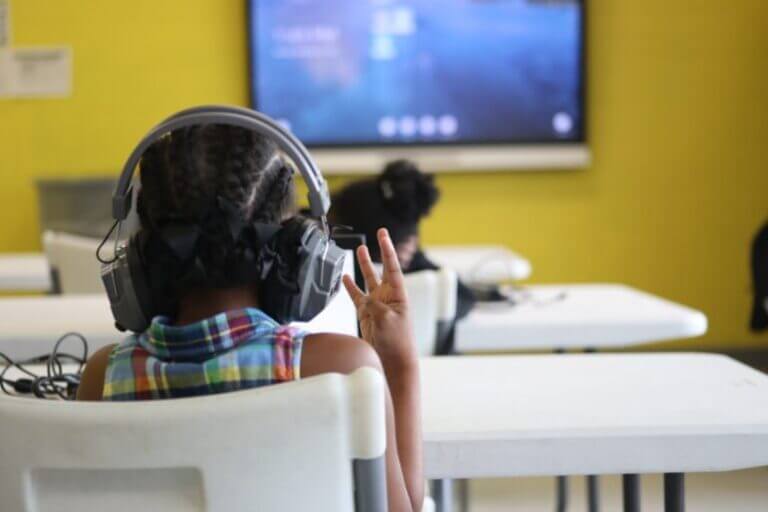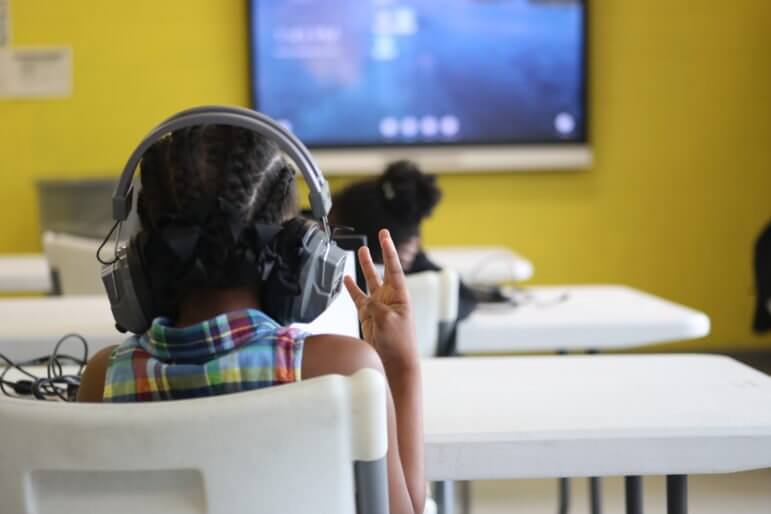

LaMiracle holds up her answer, four, during virtual class at the Boys and Girls Club Capitol Street unit in west Jackson on Sept. 21, 2020.
Despite initially capping the award amount at $1 million for a 16-week program serving a minimum of 10,000 Mississippi children, Gov. Tate Reeves gave nearly twice that in federal funds to a Utah-based organization serving only a fraction of the number of kids.
Waterford.org requested and received $1.9 million to provide a virtual, 20-minute-a-day computer program to 2,500 4-year-olds in Mississippi — more than twice the amount received by other schools, child care centers and education organizations that also received grants from the Governor’s Emergency Education Relief (GEER) fund. These are federal relief funds for education distributed to the state through the Coronavirus Aid, Relief, and Economic Security (CARES) Act. Reeves has full discretion over the spending of that money.
The organization, in its application for the funds, obtained by Mississippi Today through a public records request, acknowledged its request exceeded the guidelines.
“… our proven pandemic recovery impact, past performance, and ready network of partners justifies this request and positions us to do much more than ust (sic) meet the pandemic moment — we will build capacity for both children and their families for a lifetime!” the application stated.
A spokesperson for Waterford.org said 65% of the grant will go toward providing devices and connectivity to participants who need it. The group said it also hired an additional seven coaches to work with families, bringing the total number of coaches in the state to 13.
Waterford.org “identified the need for more than the $1 million maximum award and explained the increased costs were a result of more households being served and providing internet service and devices to each participating family,” said Bailey Martin, press secretary for Reeves’ office, which is administering the $34.6 million of GEER funds. “Upon review, our office determined these costs to be justified and to the benefit of the children and families in the state of Mississippi.”
Waterford.org, formerly the Waterford Institute, is not new to Mississippi. It launched its signature Upstart program — a 15- to 20-minute-a-day computer adaptive program for preschoolers — in Utah in 2009. The Utah Legislature funded the program, and it has since expanded to at least 15 states across the country.
Up until now, however, the group’s attempts to secure public funding in Mississippi have been unsuccessful. Lobbyists working for the company visited the Mississippi Capitol in 2011, 2012 and 2013, but several bills that would have created and funded the Mississippi Upstart project were unsuccessful after receiving pushback from some public education groups.
“‘Virtual’ education is not an appropriate or effective means of educating preschool children, and state tax dollars should not be used to further line the pockets of a wealthy family from out of state,” stated a 2012 email from The Parents’ Campaign, a group that advocates for full funding of the Mississippi public school system, to its members about the bill.
The “wealthy family” referred to in the email is the Heustons. Dustin Heuston, a former college teacher and headmaster of a K-12 school in New York City, founded Waterford in 1976 and began creating educational technology and software.
After he stepped down in 2016, Benjamin Heuston, his son, took over the company as president and CEO. Benjamin Heuston earns $331,800 a year in that role, according to the nonprofit’s 2018 tax forms.
Since 2016, Waterford.org has been active in Mississippi using private funding. They have partnered with organizations such as the Mississippi Head Start Association and Jackson Public Schools to provide the program to a total of 3,639 low-income children in areas of the state where literacy scores are low.
The program intends to supplement, not replace, preschool, company officials have said.
“We work with students prior to them entering kindergarten. We are not a program that replaces a site base or tries to get kids not to go to brick and mortar schools,” said LaTasha Hadley, vice president of state education partnerships and the point person in Mississippi for the company. “We only use our software to fill in gaps and give extra boosts to cognitive learning.”
As part of the program, students and families are provided devices and costs to cover internet services if needed. The students log on for 15 to 20 minutes a day, five days a week. Coaches help parents monitor the child’s progress and provide other guidance.
Some in early education who are familiar with the program say it works.
Nita Norphlet-Thompson, executive director of the Mississippi Head Start Association, said Upstart has “absolutely” made a positive impact on Head Start students who have participated.
“Just looking at the data of the children, the assessment scores, they’re showing marked improvement,” she said. “Then having conversations with the families, they talk about not only how they see improvement in terms of educational outcomes but how it’s helping their families sort of re-evaluate their whole perspective on early education.”
Jackson Public Schools also partners with the company to provide the program to its preschoolers. William Merritt, assistant superintendent for the district, said the program has “proven to be an asset in helping close the gap in reading and math. It’s a quality program.”
The organization also touts studies produced by its own research arm and several third-party studies as evidence of its success. One of those outside studies focused on a group of Mississippi children who participated in the program nearly two years after the start of their preschool year.
Half of the children in the study participated in Waterford’s literacy program, while the other half participated in the math program. Results showed kindergartners from the reading program scored higher on measures of literacy than the other group, and similarly, those in the math group outperformed students in the literacy group on measures of math skills.
The study warns to interpret the results with cautions due to limitations in “the lack of highly related baseline measures to control for preexisting differences in learning achievement,” and because the final sample size was limited due to lack of family participation and the onset of the COVID-19 pandemic.
Waterford.org also received an innovation grant from the U.S. Department of Education, and a study looking at early literacy outcomes of the reading program in rural, low-income areas showed some positive benefits. It found a significant difference in children’s mean scores on letter knowledge and phonological awareness, but no differences in measures of vocabulary and oral language or listening comprehension.
Critics, however, say money would be better used toward traditional pre-kindergarten, particularly in states like Mississippi where high-quality public early education options are limited. Only 27% of 3-year-olds and 33% of 4-year-olds attend publicly funded early childhood education centers, including Head Start, according to the National Institute for Early Education Research’s 2019 State of Preschool report.
“It (Waterford) is not going to change the fact that kids are still not getting quality early childhood education that they need, and that comes from having trained adults who understand child development” and learning through play, said Denisha Jones, co-founder of Defending the Early Years, a nonprofit founded in 2012 that advocates for quality early childhood education that includes active, developmentally appropriate, play-based approaches to learning. “And it doesn’t solve the fact that parents need child care so they can go to work. If there’s one thing we’ve learned (from virtual school), if the parent isn’t sitting there next to the (young) child, it doesn’t happen.”
State leaders should take a more long-term view, even during the pandemic, Jones said. She points to research that shows learning through play and using all five senses is more beneficial to children’s healthy development than time spent in front of a screen.
But Reeves said in a statement that the program is another way to “ensure all children in our state are afforded the ability to get the same start to academic, life and career success.”
The program is being made available to children in Mississippi regardless of income level, though the organization says 93% of participants’ families are at or below 185% of the federal poverty level — an annual income of around $48,000 for a family of four.
By the end of the 16 weeks, Waterford.org’s goal is for at least 65% of participating children to achieve a “school readiness” score on the Waterford Assessment of Core Skills which will be administered in February.
The post Gov. Tate Reeves capped federal education grants at $1 million. This Utah-based group received nearly twice that amount. appeared first on Mississippi Today.
- House passes Jackson water authority bill with more say from city leaders - February 11, 2026
- Two former Delta law enforcement officers plead guilty to drug trafficking - February 11, 2026
- Push to restore Mississippi voters’ right to ballot initiative fizzles again - February 11, 2026